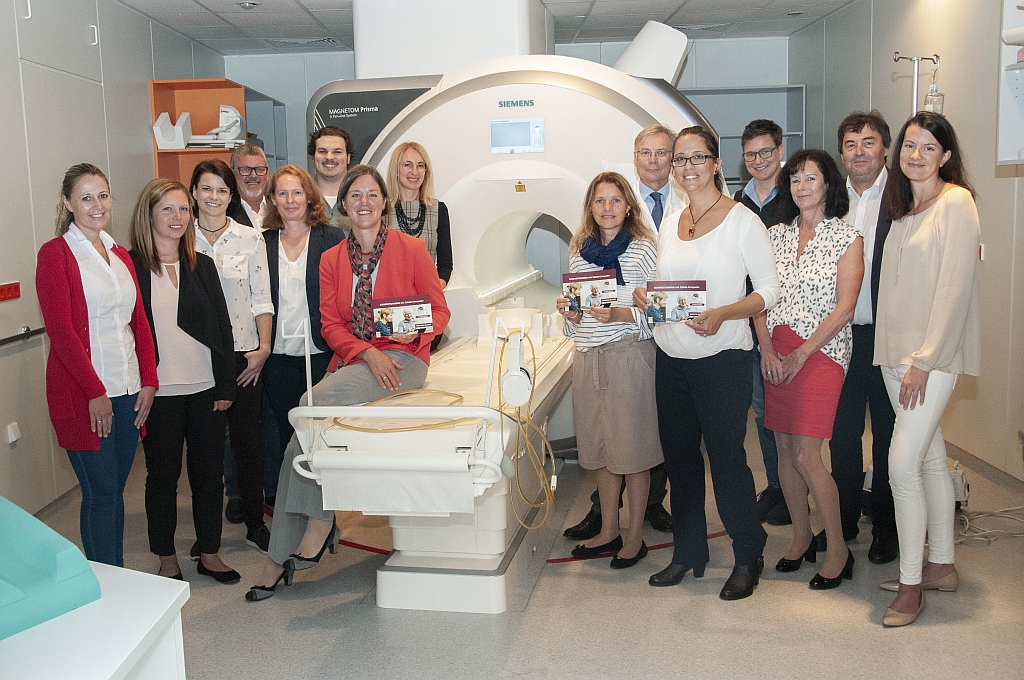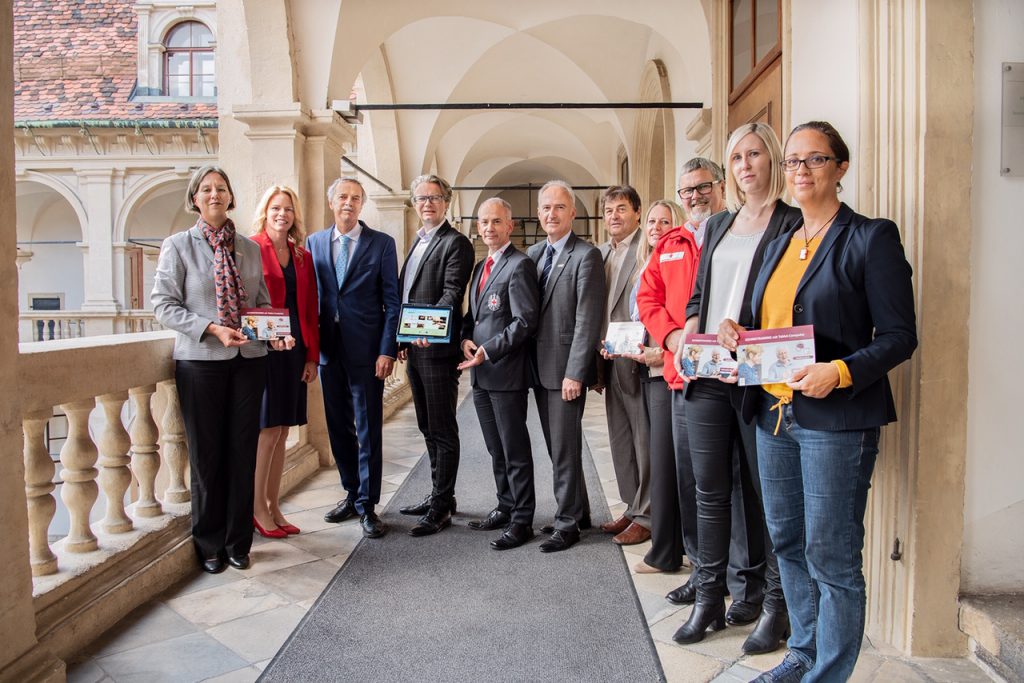Christopher Drexler, Styrian State Councillor for Health and Nursing (4th from left) with Wolfgang Pribyl, CEO of JOANNEUM RESERACH (3rd from left), Caroline Schober-Trummler, Vicerector of Medical University of Graz (2nd from left) and Andreas Jaklitsch, CEO of the Styrian Red Cross (5th from left) with members of the project team. Credit: JOANNEUM RESEARCH/Schwarzl
According to current estimates, 130,000 people in Austria live with dementia. Due to a continuous increase in age, this proportion will double by 2050. One of the greatest social challenges is adequate care, especially in one’s own living environment. Alzheimer’s dementia is considered incurable, and large pharmaceutical companies have recently even stopped researching new drugs. The combination of cognitive, physical and social activation through playful approaches promises considerable potential for success. Researchers from DIGITAL, the Institute for Information and Communication Technologies, have initiated a unique reference study in the field of dementia research: “multimodAAL” is an international lighthouse project and, with the combined expertise of all consortium partners, forms a network node for dementia in Styria – AUSTRIA.
For dementia research, this large reference study represents a unique novelty to date, as it brings together diagnostics using neurological magnetic resonance imaging, nursing science examinations and tablet-based activating training for the first time. This has not yet been done in a single study. This ambitious, three-year project is carried out by JOANNEUM RESEARCH DIGITAL together with the Medical University of Graz (Department of Neurology and Institute for Nursing Science), the Austrian Red Cross, the Sozialverein Deutschlandsberg and HS&I Health System Intelligence e.U.
Christopher Drexler, Styrian State Councillor for Health and Nursing, emphasizes: „We have developed a broad range of measures for Styria based on the nationwide dementia strategy in order to enable those affected by dementia to lead a good life and to support their relatives. With the research focus “Active and Assisted Living”, work is being done on new forward-looking methods to better understand Alzheimer’s dementia and to make life easier for patients with their disease. As a leading research and development country, Styria is thus setting new international standards in health care. It is not for nothing that we are a pioneer country in Austria when it comes to digital health and care applications to support patients and those in need of care. Every new finding that improves life with dementia is a great success for our society.“
The Institute DIGITAL of JOANNEUM RESEARCH has a research focus on Active and Assisted Living (AAL) and digital care with a focus on neurodegenerative diseases: With its methodological expertise in the areas of serious games for people with dementia, social robotics, human factors laboratory and affective computing, the institute is a leader in the research and development of innovative solutions for this disease.
Maria Fellner, project manager, about the project goals: „110 people in the early stages of Alzheimer’s dementia use the varied, tablet-supported training for mental and physical activation together with their trainers over a period of 18 months and in the meantime also alone. With the help of the numerous accompanying studies, we want to scientifically prove the effectiveness of this intervention in comparison to a randomized, equally large control group. At the same time, we will use the data obtained to break new ground in monitoring and diagnosing this disease.“
Prof. Reinhold Schmidt, Department of Neurology of the Medical University of Graz, explains the importance of this study: „Mental activity and education, inclusion in social networks, physical fitness and risk factor modification are the key to preventing Alzheimer’s disease. Multimodal training programs, which include these different domains, are a hope in Alzheimer’s therapy. multimodAAL tests a tablet-based program, which is suitable for training in a home environment and thus transfers findings from basic research into clinical routine and into the everyday life of patients at home. The project is a pioneer in evaluating the effectiveness of complex training programs to improve the cognitive performance of Alzheimer’s patients.“
With this project, the Institute for Nursing Science of the Medical University of Graz is further expanding its focus in the field of new technologies in nursing and can incorporate these findings directly into practice and into the new university course “Dementia Care”.
In recent years, the Sozialverein Deutschlandsberg has established itself as a contact point for dementia issues. The individual Alzheimer’s Syndrome (M.A.S.) trainings are specially tailored to the needs of people with dementia. Thus, each person can be addressed individually. Depending on the stage of dementia, those affected are “picked up” where they currently are according to their abilities and resources.
The Styrian Red Cross is also an important point of contact not only for providing dementia sufferers with needs-based support, but also for promoting their abilities to the best of their ability. Through targeted training of existing skills, personal independence should be maintained for as long as possible. Social contact plays an important role: In all offers of the Red Cross, competent professional and volunteer employees are available to assist those affected. They undergo regular training and thus maintain a sensitive, respectful and appreciative relationship with those affected and their relatives. Because it is not the illness that is the focus, but always the person himself.
Accompanying the intervention study, the health economic perspective will be examined by Maria M. Hofmarcher-Holzhacker, an internationally recognised expert.
More informationen on the project: www.multimodAAL.at
Training with tablet computer: Interested persons may apply as study participants: https://multimodaal.at/wie-verlaeuft-das-projekt/
multimodAAL – Playful multimodal intervention, monitoring and decision support for activation of people with Alzheimer´s dementia

Contact
DI Silvia Russegger, MBA
JOANNEUM RESEARCH Forschungsgesellschaft mbH
DIGITAL – Institute for Digital Technologies
Leonhardstraße 59,
A-8010 Graz, Austria
+43 316 876 – 1637
office@multimodAAL.at
> Press release as of 20 Sept. 2019 <


